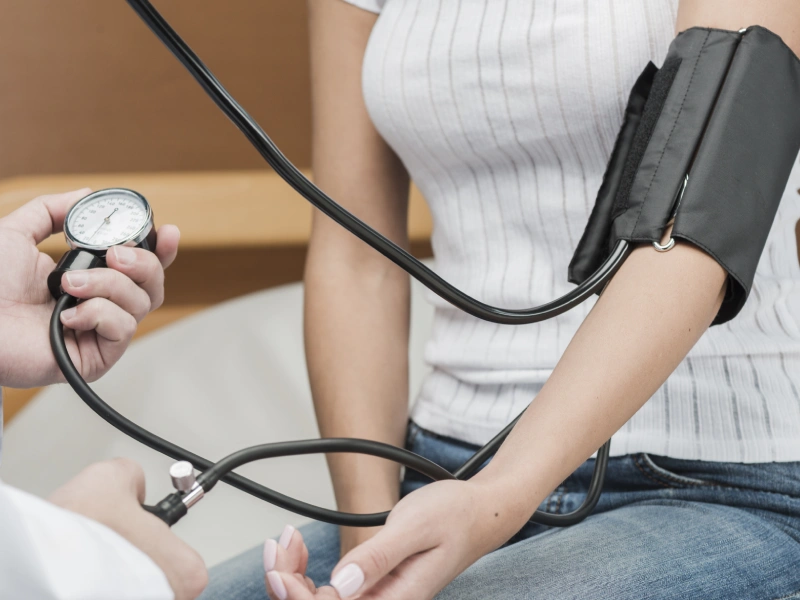High Blood Pressure

Hypertension or high blood pressure, the most prevalent condition, impacts the arteries in the body. Elevated pressure of the blood exerts force against the walls of the arteries. Consequently, the heart must exert more effort to circulate blood throughout the body.
There are two factors that regulate blood pressure: the quantity of blood the heart pumps and the resistance of the arteries to blood flow. An increase in blood pressure results in a higher volume of blood pumped by the heart and narrower arteries.
How is blood pressure measured?
Blood pressure is measured in millimeters of mercury (mm Hg). A blood pressure reading of 130/80 mm Hg or higher is classified as hypertension.
Categories and Stages of High Blood Pressure
High blood pressure is divided into two categories:
Primary hypertension also called essential hypertension
Primary hypertension, the most common form of high blood pressure in adults, does not have a clear cause. It typically develops slowly over a span of several years.
Plaque buildup in the arteries called atherosclerosis increases the risk of high blood pressure.
Secondary hypertension
Underlying causes of hypertension: This type of high blood pressure is caused by an underlying condition. It tends to appear suddenly.
The following conditions and drugs cause Hypertension:
- Cough and cold medicines, as well as some pain relievers, birth control pills, and other prescription drugs.
- Illegal substances such as cocaine and amphetamines
- Kidney failure
- Obstructive Sleep Apnea (OSA)
- Thyroid problems
- A medical examination can sometimes cause an increase in blood pressure. This is referred to as white coat hypertension.
The five blood pressure ranges as defined by the American College of Cardiology and the American Heart Association.
- Normal blood pressure is defined as ideal (120 mm Hg and 80 mm Hg).
- Elevated blood pressure (120 mm Hg to 129- and 80-mm Hg or less)
- Hypertension in the first stage: The upper limit is between 130- and 139-mm Hg, while the lower limit is between 80- and 89-mm Hg.
- Hypertension in the second stage. The upper limit is 140 mm Hg or higher, while the lower limit is 90 mm Hg or higher.
- Hypertensive crises are a severely increased blood pressure (180 mm Hg and 120 mm Hg)
Symptoms
Most people with high blood pressure have no symptoms, even when their blood pressure is dangerously high. High blood pressure can persist for years without causing any symptoms.
A few patients with high blood pressure may have:
- Headaches
- Difficulty breathing
- Nose bleeding
However, these symptoms are not specific. It usually doesn’t appear until high blood pressure reaches serious or life-threatening levels.
When should you see a doctor?
If your blood pressure exceeds 180/120 mm Hg, it is considered a hypertensive emergency or crisis. It is advised that anyone experiencing these levels of blood pressure seek immediate medical attention.
High blood pressure, if left untreated, increases the likelihood of heart attack, stroke, and other serious health problems. Starting at age 18, it is important to have your blood pressure monitored at least every two years. Some people require more regular examinations. If you have high blood pressure or other risk factors for heart disease, your doctor would most likely recommend more regular testing.
Blood Pressure Screening
Blood pressure screening is an essential part of overall health care. How often you should have your blood pressure checked depends on your age and overall health.
Ask your provider to measure your blood pressure at least every two weeks.
Get your blood pressure checked every year if you’re 40 or older, or if you’re 18 to 39 and at high risk for high blood pressure.
Children aged 3 and over can have their blood pressure measured as part of their annual check-up.
If you don’t see a doctor regularly, you can get a free blood pressure check at a health resource fair or other community facility. Some stores and pharmacies also provide free blood pressure monitors. The accuracy of these devices depends on a variety of factors, including the correct cuff; the size and proper use of the device. Ask your doctor about using public blood pressure devices.
Complications
Ventricular hypertrophy: Heart failure occurs when the heart is unable to pump enough blood to meet the body’s demands.
Kidney problems: High blood pressure can damage blood vessels in the body. This can result in vascular dementia, a type of dementia. A stroke that disrupts blood flow to the brain can potentially lead to vascular dementia.
Management Healthy lifestyle practices can help, including not smoking, exercising and eating healthy. For some people, high blood pressure medication is required.